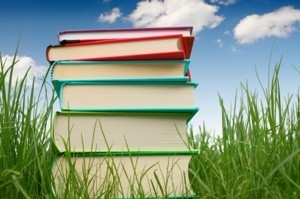
If you like to read, you might be interested to know that it takes somewhere in the neighborhood of 5 trees to print 1,000 books. At first glance this may not sound like much, but consider the fact that about 3 billion books are sold each year worldwide. Add in the electricity, water, greenhouse gases, pollutants and landfill space needed to produce each book, and suddenly you have a low-key activity with a high environmental impact. Here are some ways you can be a greener reader.
Today's libraries are connected to electronic databases that allow you access to nearly everything that's available on the Internet or in print. If your library doesn't carry a copy of an item you need you can usually request that it be brought in. P>Bonus: libraries are staffed with knowledgeable staff ready to help you find things.
BookMooch.com and PaperbackSwap.com are two examples of dozens of Internet book exchanges that let you get rid of books you no longer need in exchange for books you really want.
With access to thousands of titles at your fingertips, the only cost to using these sites comes from the cost of mailing your books to other members. Most sites work on a point system, which means every time you offer someone a book, you earn a point that enables you to select a free book from another user. Once you've received and read the book, you can either keep it or send it back into circulation for other site users.
Nearly every bookstore has a clearance section. This is where you'll find copies of overstocked books and books leftover from final print runs. The beauty of these sections is twofold. Not only are these books deeply discounted (and often by best-selling authors), but buying them doesn't add to the demand for new books because they need to be gotten rid of anyway.
Used bookstores are just one place to find used books. Flea markets and rummage sales are two more. Many public libraries also hold annual books sales to clear out overstocked shelves and raise funds to bring new books into circulation. If you like to shop online, check out eBay, or shop the "more buying choices" section at Amazon and Barnes and Noble.
Buy New While Supporting Literacy
Books sold on BetterWorldBooks.com help fund high-impact literacy projects in the United States and around the world. All books are available with free shipping to any location within the United States (or $3.97 worldwide), and every order is shipped carbon neutral with offsets from CarbonFund.org.
In addition to selling new titles, Better World Books supports book drives and collects used books and textbooks through a vast network of college campuses and libraries nationwide. To date the company has converted more than 25 million donated books into $6.5 million in funding for literacy and education, all while keeping more than 13,000 tons of books from landfills.
Read Ebooks And Listen to Audiobooks
Books have gone digital. Using ebooks (electronic books) and audio books saves natural resources, and recent advances have finally made these technologies a viable option to publishers, libraries, and readers. Books and magazines, lectures, white papers, and even university courses are available from hundreds (if not thousands) of online sources, some free and others requiring paid membership. Two of the largest online collections of FREE ebooks are Project Gutenberg (www.gutenberg.org) and the World eBook Fair (www.worldebookfair.com).
Also check out:
For free audio books, try LibriVox. Volunteers record chapters of books in the public domain and then release the audio files back onto the net for free. All their audio books are taken from the public domain, so you may use it for whatever purpose you wish.
Share with Friends and Coworkers
After years of reading, most readers tend to accrue a sizeable personal library. Swapping books with friends and co-workers is a great way to "recycle" your books, as well as discover new authors, subjects, and genres you would not normally choose for yourself. If your workplace has a break room, set aside a box marked "book exchange" and drop in a few copies to get things rolling.

About The Author: Ellen Brown is an environmental writer and photographer and the owner of Sustainable Media, an environmental media company that specializes in helping businesses and organizations promote eco-friendly products and services. Contact her on the web at http://www.sustainable-media.com
Add your voice! Click below to comment. ThriftyFun is powered by your wisdom!
After having paid too many library fines, I have found that buying used books is cheaper for me! I can usually find $.25/$.50/$1 books in thrift shops, yard sales, library sales, etc. I have always further recycled these at book swap bookshelves I frequent (also getting some new ones at the same time.) Recently I have found that I can turn in the better used books at a local used bookstore for trade $ - which I then immediately use at their $.50 bargain book shelves! That's a win/win. (And then the $.50 books get recycled elsewhere).
When you are finished reading a book, check out www.bookcrossing.com
You can register your book there and send it on a journey you and others can track. Not only is it interesting but you are sharing your books with others.
If you have a Blackberry, you can get a free Kindle download from amazon.com and read books on your Blackberry!
Add your voice! Click below to comment. ThriftyFun is powered by your wisdom!